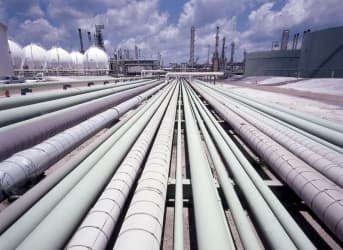Supporters of pipelines that cross international frontiers have fervent supporters in the energy industry, who maintain that they are “win win” solutions for both energy producing nations and transit countries.
The reality is however that the true picture is more mixed, as the following survey shows.
Perhaps Exhibit A for the view that international pipelines in fact raise tensions is the ongoing dispute between Sudan and South Sudan over the latter’s exports through Khartoum’s pipeline network to Port Sudan.
The issue?
Transit fees – South Sudan proposed paying $1 per barrel, while Sudan insisted on a $32.20 per barrel tariff, causing the South Sudanese government in late January to declare force majeure on loading its supplies of Nile and Dar Blend crude into pipelines, and on 25 January 25, South Sudan's parliament agreed to halt oil production in the country.
Neatly encapsulating the dispute, south Sudan President Salva Kiir Mayardit , speaking at the 18th African Union Assembly in Addis Ababa, Ethiopia on 30 January said, "We acknowledge that most of the oil infrastructure lies on the territory of Sudan, however, the oil clearly belongs to South Sudan. This unilateral decision to take our crude entitlements is unmistakably a violation of the sovereignty of South Sudan and must be condemned."
The situation has so alarmed China, which imports the majority of South Sudan oil exports, that it is attempting to mediate the dispute.
Closer to home, the proposed Keystone XL pipeline, designed to transit oil tar sands oil from Alberta fields in Canada across the U.S. to refineries on the Gulf coast, has become a hostage to election year politics. A complicating factor for Keystone XL proponents is that oil sands petroleum has a higher carbon footprint than oil produced from fossil, with the only wrangling being how much higher the proportion of carbon dioxide is.
The Keystone XL pipeline aroused the fierce opposition of environmentalists and some politicians in diehard Republican states such as Nebraska as well and late last year the Obama administration postponed a final decision on the pipeline until 2013, infuriating the pipeline supporters as well as Republicans, who tried to sell it as a job creation project.
Overplaying their hand however, last month congressional Republicans attached a rider to legislation extending the payroll tax cut to force the White House to make a decision on the pipeline within 60 days. It did, and the answer was “no,” leading the Conservative government of Canadian Prime Minister Stephen Harper to fume that they would sell their tar sands oil to China instead.
Success stories?
The $3.6 billion, 1 million barrel per day, 1,092-mile Baku-Tbilisi-Ceyhan pipeline, which began operations in May 2005. The BTC transits high-quality crude from Azerbaijan's offshore Azeri-Chirag-Guneshli fields to Turkey's deepwater Mediterranean terminus at Ceyhan, generating transit fees for Azerbaijan, Georgia and Turkey along the way.
Another quiet success is the Turkmenistan-China 1,139 mile-long, 40 billion cubic meters (bcm) per year natural gas pipeline, financed by China National Petroleum Corporation (CNPC), China's largest oil and gas producer and supplier, which began operations on 14 December 2009. The Turkmenistan-China pipeline has since been expanded to carry Uzbek and Kazakh natural gas.
Further cementing its presence in Central Asia’s natural gas market, on 30 June 2011 China announced its second pipeline with Turkmenistan, a $22 billion, 5,370 mile pipeline with an annual capacity of 30 bcm, had begun operations.
So, who’s happy with the sales and transit revenues?
Turkmenistan, Kazakhstan, Uzbekistan and China.
International projects on the drawing board include the proposed $7.6 billion, 1,040 mile-long Turkmenistan-Afghanistan-Pakistan-India (TAPI) natural gas pipeline, which may become a reality is Afghanistan and Pakistan can ever quell their insurgencies, and the Nabucco 56-inch, $11.4 billion 2,050-mile Nabucco natural gas pipeline, first proposed in 2002. Nabucco may begin operations if it ever finds sufficient input, as currently its sole promised volume its proposed 31 bcm annual capacity is Azerbaijan's future offshore Caspian Shah Deniz production, estimated at 8 bcm.
So, the picture for international pipelines is mixed. For such expensive projects to succeed, a number of factors have to come into play, including quiescent bilateral relations between producing and transit nations, placid domestic politics, financing and sufficient volumes for throughput. If all lines up and pipelines come online, the revenues can be substantial, but the best advice for potential investors is, as always – caveat emptor.
By. John C.K. Daly of Oilprice.com


















"Always" is probably slightly incorrect, but I have been following the progress of Nord Stream - the pipeline at the bottom of the Baltic. It will carry gas and not Russian Special Operations soldiers, as some people think, and (ceteris paribus)it will contribute to lowering energy prices here in Sweden.